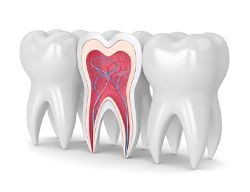Root Canal Therapy – Allentown, PA
Fast, Effective Relief for Your Toothache

If your emergency dentist in Allentown has recently recommended that you have a root canal, you are probably a bit hesitant. Let’s face it, they have a bad reputation for being painful; however, you might be surprised to learn that they are now no worse than a traditional dental filling. Using the most advanced technologies and techniques, Dr. Eric J. Marsh and Dr. Michele A. Pisano-Marsh will rehabilitate the health of your tooth while promoting the appearance of your smile.
What Is a Root Canal?

A root canal is a procedure during which the infected center portion of your tooth (also known as the pulp) is removed. Although this may sound painful, we will make sure you are numbed up beforehand with local anesthetic. First, we create a small hole in the tooth to access the pulp. Then, the center of the tooth is taken out and replaced with a synthetic material called gutta-percha. Next, the tooth is sealed back up and restored with either a filling or temporary crown, since the tooth will be vulnerable from that point on. If a crown is used, you’ll return to our office a few weeks later to receive your permanent crown. Many teeth that are treated with root canal therapy and then restored with a crown go on to last the rest of a patient’s life.
When Is a Root Canal Needed?

Here are some common signs that you might need root canal therapy:
- Persistent pain in one tooth, especially when chewing or biting
- Lingering sensitivity to heat and/or cold
- Pimple-like bump on the gums
- Dark discoloration of the tooth or surrounding gums
- Swollen gums near the affected tooth
What Can I Expect After a Root Canal?

For the first few hours after your root canal treatment, your mouth is still going to be numb. As a result, you should avoid eating until the anesthetic has worn off. When you do eat, refrain from chewing with the tooth that received the root canal, as it will be tender. You can expect to deal with some degree of soreness and possibly swelling for the next few days. This can be managed by taking your prescribed or over-the-counter pain medications like ibuprofen. Alternatively, you could apply a cold compress to the appropriate cheek for ten-minute intervals until the swelling and pain go down.
Do you have a severe toothache or any of the other symptoms listed above? You may need root canal therapy. Thanks to advancements in modern dental medicine, you have nothing to be scared of when it comes to root canals. Contact us today to schedule your appointment. We can provide fast, effective relief for your toothache.
Understanding the Cost of Root Canals

The cost of each root canal depends on its particular circumstances. Before you can receive this treatment, you’ll need to have a consultation at our Allentown office so one of our dentists can evaluate the health of your mouth and provide a cost estimate. While the procedure might sound a little costly, it can prevent more invasive and expensive dental treatments from being necessary later. We’ll also be happy to go over the details of your insurance plan and financing options with you.
Factors That Can Affect Root Canal Cost

The overall cost of your root canal will depend on several factors, including:
- The type of tooth being treated: The farther back in your mouth the troubled tooth is, the more roots it will have and the more complicated the procedure will be, making it more expensive.
- The complexity of the procedure: While we like to perform root canals in our office, we may sometimes refer patients with especially complex cases to endodontic specialists who use different pricing structures.
- Any additional services: If your root canal treatment involves additional treatments like a dental crown, the cost will be represented in your final bill.
Is It Cheaper to Pull My Tooth?

While tooth extractions are usually cheaper than root canals, going down that route involves losing a tooth, recovering from surgery, and the additional costs of replacement. Dentists typically recommend replacing lost teeth as soon as possible to prevent issues like gum disease, the neighboring teeth drifting out of alignment, bone erosion in the jaw, and dental injuries due to uneven chewing pressure. Tooth replacements like implants, dentures, and dental bridges are not cheap and may need expensive replacements after years of use.
Root canals, on the other hand, allow you to keep your natural tooth and are usually a one-time treatment, meaning that they are often far cheaper in the long run than extractions.
Does Dental Insurance Cover Root Canals?

Dental insurance usually covers root canals by 50% to 80% after the deductible has been met since they are considered restorative procedures that can prevent further damage. Since every insurance plan is different, it’s important to make sure that you understand what your provider will pay for before you begin treatment. Our team will be happy to help you understand what your plan offers and discuss any concerns related to payment. If you have any questions, don’t be afraid to ask our team.
Root Canal FAQs

How Long Does It Take to Recover from a Root Canal?
No two smiles are the same, meaning the recovery time will vary from person to person. However, most patients can expect to return to work or school the day following their root canal. For the first few days after your procedure, you’ll likely experience mild soreness and discomfort. You can alleviate these symptoms by taking your medications as directed. During your recovery, make sure you stick to a diet of soft foods and chew on the side of your mouth away from the root canal. If your job requires physical labor, you should request two to three days off as vigorous exercise can negatively affect the healing process.
Can I Eat Before a Root Canal?
Are you being sedated for your procedure? You’ll be asked to fast for a few hours beforehand to lower the risk of nausea caused by the sedative. If not, you can eat a healthy meal a couple of hours before your root canal since you won’t comfortably be able to eat afterward. Just don’t forget to brush and floss your teeth before your appointment!
Are Root Canals Painful?
Root canal therapy used to be a painful procedure. However, thanks to advanced technologies and techniques, it’s now about as comfortable as getting a cavity filled! In most cases, the pain associated with root canals comes from the intense toothache that warrants the procedure. Since root canal therapy removes the infection within the tooth, it actually helps relieve you of this severe pain. Before your procedure, your dentist will numb your mouth and administer sedation (if needed) to ensure you’re completely comfortable from the beginning. Afterward, your mouth may feel slightly sore and sensitive for the first few days following your root canal. Luckily, these symptoms will fade away after two to three days with the help of medication and cold compresses.
How Long Does a Root Canal Take?
Most root canals can be completed in just one appointment. However, there are some instances where it can take up to two. During your first visit, your dentist in Allentown will place a temporary antibacterial medicine in the tooth to relieve pain. Then, the inside of your tooth will be cleaned out at your second appointment. The actual length of root canal therapy can range anywhere from 30 to 90 minutes or more, depending on the location of the tooth. Generally, the farther back in the mouth you go, the longer your root canal will take.
